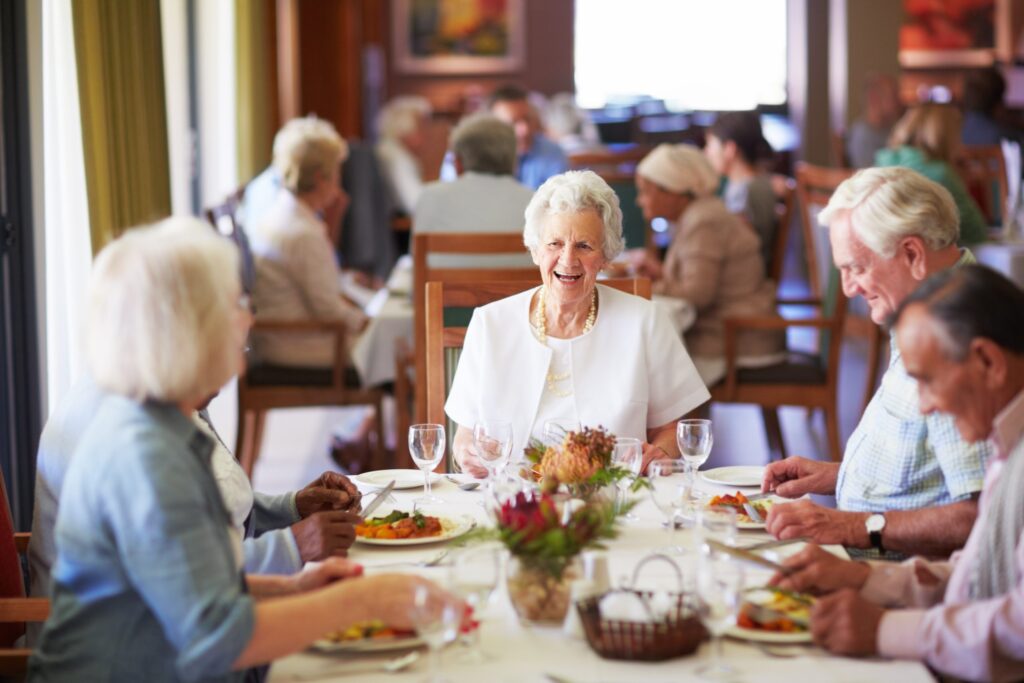If you ate alone day after day, how long would it be before you stopped cooking elaborate dinners and started microwaving frozen dinners? Would you always eat a balanced meal, or would you swap protein for pie? Eating alone isn’t easy. It can be especially difficult for the nearly one-third of older adults who live alone. Research shows that people who eat most of their meals alone may be at increased risk for heart disease and diabetes. Seniors who regularly eat alone are often at higher risk for a variety of health issues, especially malnutrition.
“They’re not socializing, so they can become isolated, which can cause them to have depression,” says Bianca Syriac, Marketing Director at The Ivy at Ellington. “Also, when eating alone, a lot of seniors eat convenience foods instead of nutritious, balanced meals. It is much easier to microwave a readymade meal versus cook a nutritious and well-rounded meal.”
Here’s a closer look at the hidden dangers of eating alone and why social eating is healthy eating for seniors.
Nutritious Meals
Cooking a big, healthy meal for one can feel like a burden, so many seniors don’t. Also, eating behavior is strongly influenced by who you’re eating with. So when you bring the grandkids over for dinner, maybe your parent eats their veggies. But when your parent is home alone, they might be more likely to eat chips and salsa for dinner in front of the TV instead.
“Most seniors aren’t eating a balanced diet,” Syriac says. “They are skipping meals and eating leftovers and convenience foods.”
Eating improperly leads to a weakened immune system, loss of muscle and bone health, and loss of weight. All of these factors can contribute to other issues, such as the risk of falling and breaking bones. Eating the wrong things can also lead to weight gain, which can increase blood pressure and cholesterol.
“Not having a proper diet affects not only overall health but also energy levels,” Syriac warns.
If your loved one gained or lost a considerable amount of weight in a short period of time, or if they’re constantly complaining about always feeling tired, they might be suffering from malnutrition that’s exacerbated by eating alone.
Social Experiences
Grocery stores and markets often have relatively healthy prepared foods, such as rotisserie chicken, meatloaf, and veggie-heavy salads, and services like Meals on Wheels can deliver nutritious meals to your loved one’s doorstep. However, there remains a problem: Eating is a social activity. For many, mealtime is a shared family experience, a time for stimulating conversation and companionship. For seniors who live alone, mealtime is a lonely experience. Seniors are already at a higher risk for loneliness and isolation, so social disconnectedness at the dinner table only increases the risk of depression. Encourage your loved one to eat meals at the local senior center or invite neighbors over for dinner. Living in an assisted living community helps some seniors eat better, too. Dining programs at assisted living communities are often overseen by a registered dietitian to ensure that the menu is nutritionally balanced, and top chefs are hired to create a dining experience that caters to each resident. Additionally, there is a strong sense of community in the dining room to help residents feel connected and welcomed.
“Eating in the dining room and socializing with peers helps residents create friendships,” Syriac says. “This not only helps create a sense of purpose for the resident but also lowers their anxiety.”
Quick Tips
If you’re concerned about your loved one’s eating and dining habits, talk to them about how eating nutritious foods will help them have more energy and feel better about themselves and how eating with others can make eating more fun. Here are some ideas:
- Invite a neighbor or friend over for dinner.
- Eat at the local senior community center.
- Ask your church about meal partners.
- Stop by a nearby assisted living community for lunch.
- Go out to eat.
- Encourage your extended family to bring back the family meal.
Sharing meals with others promotes nutritional and emotional well-being. By establishing some simple habits and rituals, you can help make mealtimes easier and more enjoyable. {{cta(‘1b6793fc-4269-48c0-ac2a-834befec726b’)}}

